In 2023, Nusaiba Rilwanu, 15, completed her Junior Secondary School (JSS) education at the Junior Secondary School (JSS) Balle, in Gudu Local Government Area (LGA) of Sokoto State. However, she couldn’t further her education because there are no functional Senior Secondary Schools in Balle, where she lives.
Nusaiba watched helplessly as her dreams of becoming a nurse continued to slip away.
“I finished JSS3 two years ago, hoping to proceed to senior secondary school to achieve my dream of becoming a nurse,” she said with deep concern, in November 2024 “But as you can see, we don’t have a functional senior secondary school here. We would have to go to Sokoto or Tangaza.”
Pursuing higher education in Balle is a rare achievement. For any child to go beyond JSS in Balle, their parents must send them at least 36 kilometers away to Tangaza, making daily shuttling to school impossible, especially due to their economic conditions.
In Sokoto where Nusaiba lives, more than 90 percent of inhabitants are poor and live below the poverty line, according to the 2022 National Multidimensional Poverty Index released by the National Bureau of Statistics (NBS). This means parents cannot afford to send their children outside of their immediate communities due to the economic challenges that have worsened since NBS produced its report.
ThThe lack of a well-functioning senior secondary school in this community has increased the barriers to education, especially for girls. Despite the fact that her junior secondary was upgraded to SS in 2024, Nusaiba said the lack of enough teachers’ learning materials remains the main concern that wouldn’t allow her to stay there for SS.
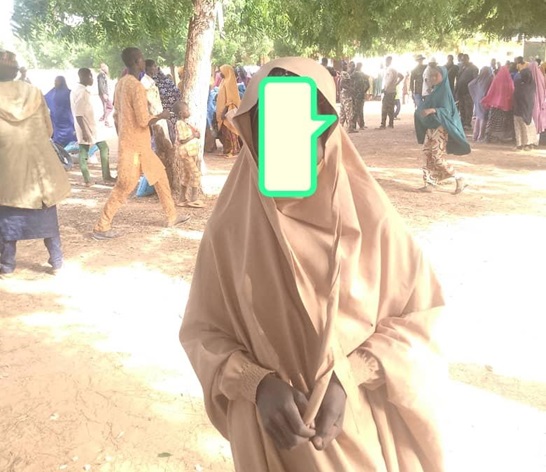
Like Nusaiba, 13-year-old student Basiru Umar, who is currently in JSS 3 at GSS Balle, is uncertain about his future.
Although the school was upgraded to include a Senior Secondary School (SSS) in 2024, there are still inadequate teachers, one of the teachers at the school confirmed to this reporter via telephone.
Sani Sabo explained that the school only has four permanent teachers for the junior and senior sections of the school. He added that instructional materials such as textbooks are also inadequate.

Gudu Educational System in Crisis
Gudu, covering an area of 3,478 km², had a population of 95,544 according to the 2006 census, with an estimated population of 139,000 in 2019. It shares a boundary with the Republic of Niger to the north and west, Kebbi State to the south, Binji LGA to the southeast, and Tangaza LGA to the east.
The Gudu Local Government is one of the hard-to-reach areas in Sokoto State, located over one hundred kilometers from the Sokoto metropolis. It also experienced one of the most devastating floods during last year’s rainy season, which damaged the road leading to Balle, its headquarters, making it difficult for commuters. As a result, travelers are forced to use an alternative sandy road. This reporter also experienced the same difficulties during a visit to Balle, where the car had to be pushed through the sand.
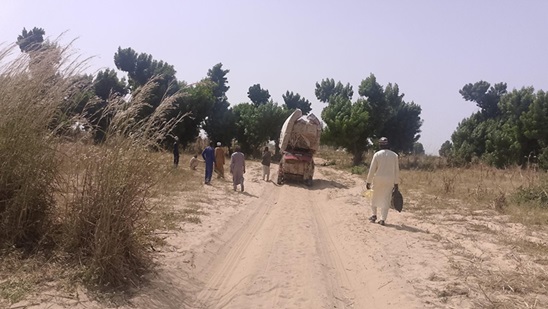
The car conveyed this reporter to Balle, on the Sandy temporary road where passengers had to walk by foot due to heavy sand.
Despite its sizable population, Gudu is still plagued by insecurity and a lack of quality education for the children in the area. This situation has raised concerns among the Gudu community, denying many children access to sound education, while many remain out of school.
A 45-year-old resident of Balle, Malam Mode, who supports his family through farming and driving an Okada, cannot ascertain the future of his children’s education.
Most of Mode’s children are in primary and junior secondary schools, while some have not attended school at all. As an Okada driver, he lacks the resources to send his children to Sokoto for further education after graduating from junior secondary school.
“I don’t know where my children will go after graduating from JSS because the newly upgraded senior secondary school we have here lacks enough teachers and essential learning materials,” Mode said, his face filled with concern.
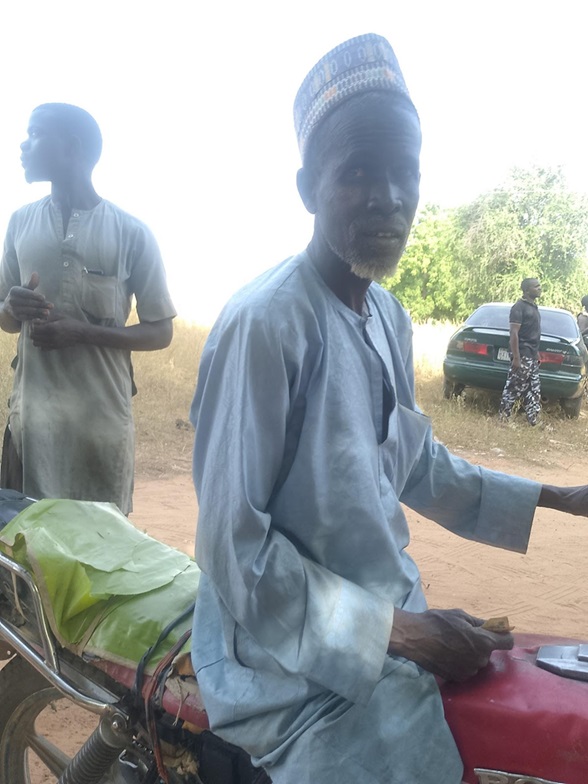
According to the 2022 Nigeria Multidimensional Poverty Index, Sokoto has the second-highest number of out-of-school children in Nigeria, at 66.4 percent. This means Gudu contributes significantly to the increase in the number of out-of-school children in Sokoto, making the state second only to others in Nigeria.
Hope Dashed: The Multi-Billion Naira Mega School Turns into a Reptile’s Home
When Governor Aminu Waziri Tambuwal announced and laid the foundation for the construction of a Mega Senior Secondary School in Balle in 2016, the community was filled with hope and optimism, believing that the educational challenges in the area had finally been addressed.
Daily Post reported that the sum of N1 billion has been earmarked for the project, although this reporter didn’t get the specific amount the government spent on the project.
However, their hopes were dashed, and they were disappointed by both past and present governments. Despite the project being completed with an impressive structure, the school remains abandoned due to security concerns and government inaction.
Bello Garba, a resident, recalled the excitement they felt when the news of the construction broke in 2016. He expressed deep pain that, despite the school being completed, the government failed to commission it.
“The school has now become a home for donkeys and reptiles. When you go there, apart from donkey droppings, reptiles, and watchmen, you won’t see anything. The roofing and infrastructure have begun to deteriorate,” Garba said.
On November 20, 2024, this reporter visited the school. As this reporter approached the gate, he was greeted by weeds and tall trees that had overtaken the premises. The beautiful and well-structured buildings raise many questions.
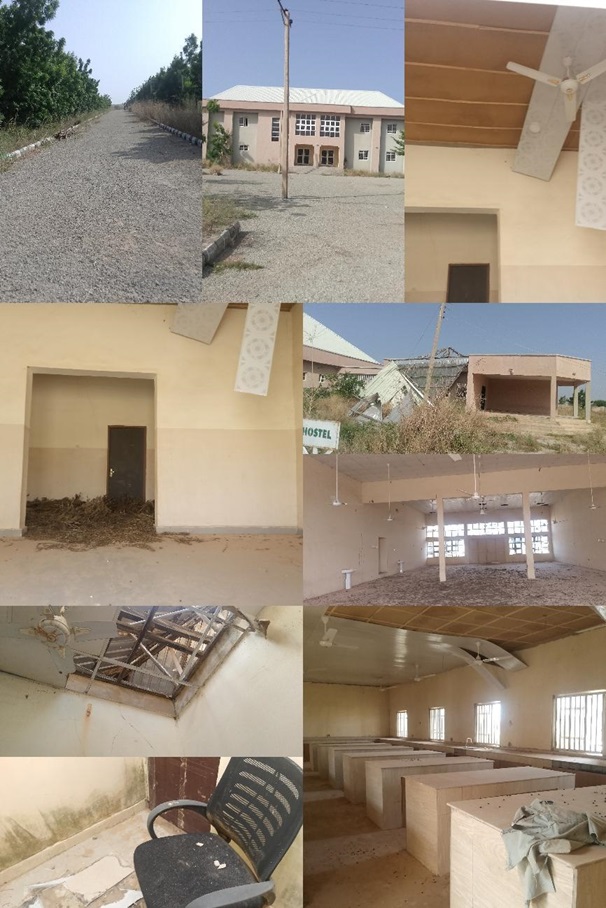
The school comprises modern classrooms, laboratories, a library, an administration block, and an assembly hall. Other facilities include a school clinic, boarding hostels, a sports complex, a corps members’ lodge, staff quarters, and landscaped grounds. All these are in shambles, overrun with reptiles, goats, and donkeys.
The ceilings, fans, chairs, and roofing are damaged due to government negligence. The weeds have taken over the school grounds.
This abandonment has severely impacted education in the area, contributing to the rising number of out-of-school children in Sokoto State. Children in Gudu have to travel to other local governments or Sokoto to pursue their education at the senior secondary level and obtain their Senior Secondary Certificate Examination (SSCE).
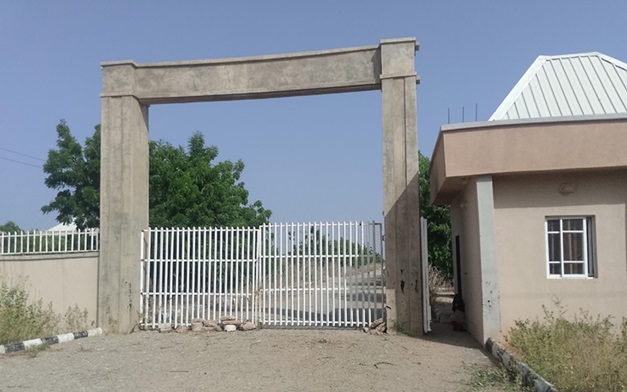
Why Was the School Abandoned?
The district head of Balle, Aminu Aliyu, explained that the abandonment of the school relates to both insecurity and government inaction. He noted that after the completion of the project in 2019, bandits invaded Balle town and killed the district head. As a result, the government put the project on hold until the end of Tambuwal’s tenure, and it has remained in limbo ever since.
“We need the government to commission that school. We also need more teachers because the lack of teachers is the main challenge facing education in Gudu,” a father of ten, Malam Mode, pleaded to the state government.
Sahara Reporters learned that the high illiteracy rate and the number of out-of-school children contribute significantly to rising criminal activity in the area, as many uneducated and idle youth are vulnerable to joining criminal gangs.
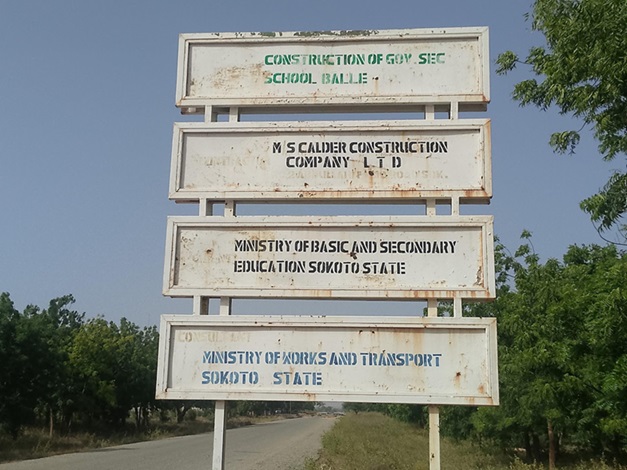
We’ve Been in This Situation for Decades—Gudu District Head
Aminu Aliyu, the district head of Gudu LGA, recounted the long history of educational challenges in the area. Since 1980, they have never had a functional senior secondary school in Gudu. Before securing junior secondary schools, children had to travel over 100 kilometers to Sokoto, Wurno, or Dange to continue their education at the secondary level. In 2007, they were given some junior secondary schools.
To address the issue, he mentioned that the community has been meeting with parents to find solutions, especially considering the current economic hardships. Parents prefer their children to attend both junior and senior secondary school locally before proceeding to higher education. However, insecurity and lack of educational resources have caused setbacks.
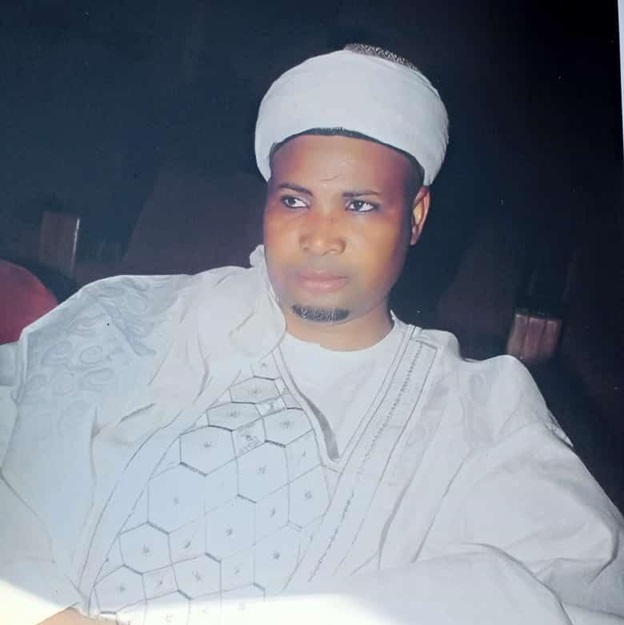
We Have to Hire Teachers to Teach Our Children—Gudu LGA Chairman
When contacted, Buhari Ahmad, chairman of the Gudu local government council, admitted that there is a significant problem regarding schools and teachers in the area. He noted that in 2024, they were able to upgrade three junior secondary schools to senior secondary schools, including JSS Balle, JSS Kurdulla, and JSS Bachaka.
However, even with these upgrades, the community still faces challenges. They must hire volunteer teachers, paying them as much as they can, to supplement the existing staff. These teachers are often not permanent and are sometimes primary school teachers transferred to teach at senior secondary schools.
“We don’t have permanent secondary school teachers, so we hire residents who are NCE and BSc holders to teach our children because sending Corps members here is a great challenge,” he said. He further mentioned that the situation worsened after the NYSC stopped sending corps members to the local government due to security threats.
Primary Schools Are Also Struggling in Gudu
The challenges extend beyond secondary schools to primary schools, as many communities in Gudu battle illiteracy due to a lack of teachers and functional schools.
According to Ya’u Umar, a resident of Darusa Yamma in Kurdulla ward, one of the hard-to-reach communities, out of more than 50 schools in Gudu LGA, most are not functioning properly.
Umar revealed that, in his district alone, Kurdulla, there are about ten schools, but except for Kurdulla, it is difficult to find any of the others operational. This is due to a lack of teachers and classrooms.
Between 2021 and 2023, the community-made a makeshift tent and hired one teacher to teach children from different areas. However, currently, the situation is dire, with many primary schools not functioning for the past five to eight years. Umar documented about 18 communities for this reporter whose children are not attending schools.
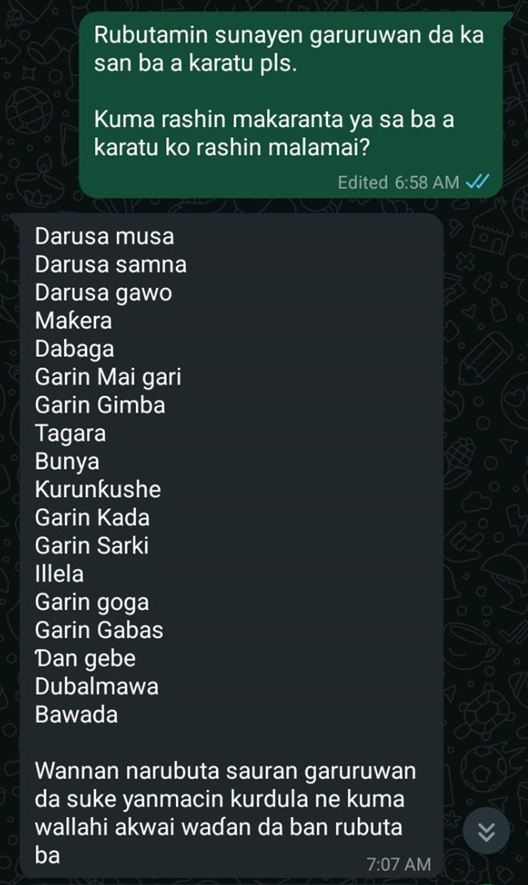
In a phone conversation with one headmaster from Gudu who preferred to remain anonymous, it was confirmed that many schools in Gudu are no longer functioning due to a shortage of teachers. Out of the 65 schools in the area, most are operational only on paper.
He noted that his school, with 18 teachers, now relies on volunteers, but only 5-6 teachers are regularly working, and they are not permanent staff, stating that this has led to a rise in the number of out-of-school children.
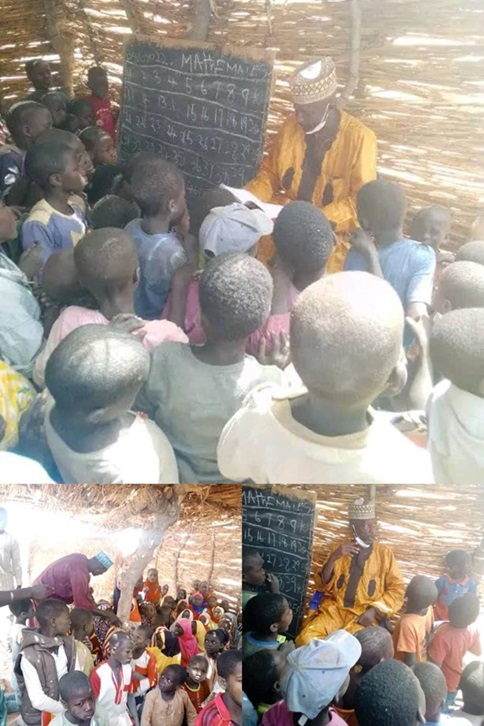
The Headmaster stated further that many parents are unwilling to send their children to school due to the lack of improvement in education, compounded by economic challenges. Additionally, many teachers have stopped attending school due to security and economic concerns, with some travelling from distant areas like Tangaza.
“No one will continue sending their children to school without seeing tangible results, especially given the current economic situation,” the headmaster stated. He added with frustration that lack of action from local stakeholders to resolve the issue, worsening the education situation in the region.
This is below the standard set by UNESCO, which states that education is an empowering right in itself and one of the most powerful tools by which economically and socially marginalized children and adults can lift themselves out of poverty and participate fully in society. However, globally, around 244 million children and youth are deprived of education due to social, economic, and cultural factors, with 98 million of them in Sub-Saharan Africa, the region with the highest out-of-school population.
Government Failed to Respond
This reporter contacted the current Sokoto State Commissioner for Basic and Secondary Education about the issue, but the commissioner asked the reporter to come to his office with his questions.
When the reporter arrived at the office, the commissioner asked him to present his ID card and introductory letter before making any comments, refusing to answer the questions despite being briefed that the reporter was a freelance journalist.
However, in an interview with The Whistler, in 2024, regarding the state government’s position on the abandoned Senior Secondary School in Balle, the former Commissioner for Basic and Secondary Education, Muhammad Tukur Alkali, explained that there are security issues in the community.
Therefore, they could not risk allowing children to be exposed to such a situation. He noted that they would suggest alternatives to ensure the goal of getting children enrolled in schools is achieved, as the government is committed to this cause.
He further disclosed that the Board was planning to advise the government on how to mobilize children from affected communities to urban areas, enabling them to continue their education. This is seen as the best way to address security challenges affecting the enrollment of children from security-prone communities in the state.
What Experts Say?
Education expert and Associate Professor Murtala Akanbi Yusuf, from the Department of Adult Education and Extension Services at Usmanu Danfodiyo University, Sokoto, noted that Gudu has long faced educational challenges, with insecurity now compounding the difficulties. He warned that without education, the community will remain backward politically, economically, socially, and culturally.
“The implication is that without education, there is little hope for the future. If people do not invest in education, the cycle of poverty and insecurity will continue,” he said.
Dr. Murtala emphasized that even with schools and infrastructure, education quality will remain compromised without qualified, motivated teachers. He suggested that the government prioritize addressing insecurity and poverty, as both are interconnected, and focuses on teacher recruitment, welfare, and training to ensure educational progress.
This report was published with the support of Civic Media Lab

